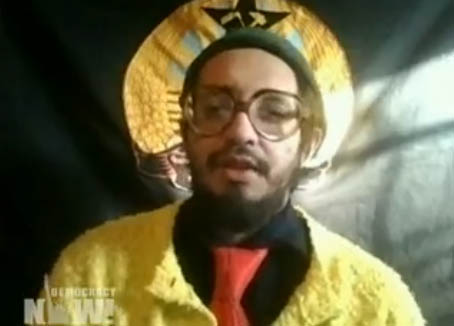You may know the adventures of Robin Hood and Zorro, outlaws fighting for the poor. Today we meet the newest member of that club, a Chilean activist who goes by the name Papas Fritas. Francisco Tapia, known as Francisco “Papas Fritas,” or French fries, says he burned $500 million worth of debt papers from the private Universidad del Mar. Chilean authorities are in the process of shutting down the university over financial irregularities. But that has not stopped the school from collecting on its student loans. During a recent student takeover of the school, Papas Fritas says he took the debt paper records, burned them and displayed the ashes inside a van as an art exhibition. “It is a concrete fact that the papers were burned. They are gone, burned completely, and there’s no debt,” said Papas Fritas in his first U.S. broadcast interview. “Since these papers don’t exist anymore, there’s no way to charge the students.”
Transcript
This is a rush transcript. Copy may not be in its final form.
JUAN GONZÁLEZ: In a Democracy Now! exclusive, we turn now to Chile, where an artist’s act of protest against student debt has gone viral. Francisco Tapia, known as Francisco “Papas Fritas,” or “French fries,” says he burned $500 million worth of debt papers from the private Universidad del Mar, the University of the Sea. Chilean authorities are in the process of shutting down the university over financial irregularities.
AMY GOODMAN: But that hasn’t stopped the school from collecting on its student loans. During a student takeover of the school, Papas Fritas took the papers, burned them, displayed the ashes inside a van as an art exhibition. He released a video describing what he called an act of love.
FRANCISCO “PAPAS FRITAS” TAPIA: [translated] It’s over. You are free from debt. You don’t have to pay one more cent. This is the artwork. This is the project, simply. This is a small project. If we all had the ability to continue doing things for love, for solidarity, we will find each other again. But we have to lose the fear, the fear of the idea about criminality that this state has wanted to impose on us, that we are criminals for being poor, for wanting our rights to be met.
JUAN GONZÁLEZ: The video has received over 120,000 hits on YouTube since it was posted last week. It comes as Chile faces renewed protests over its education system. On Wednesday in Valparaíso, authorities fired tear gas and water cannons on thousands of students demanding free education for all. President Michelle Bachelet has vowed to reform the system, but the students say her plan doesn’t go far enough.
AMY GOODMAN: Following efforts to privatize education under the dictatorship of Augusto Pinochet, the cost of higher education in Chile is among the highest in the world.
Read the full transcript in Democracy Now!










